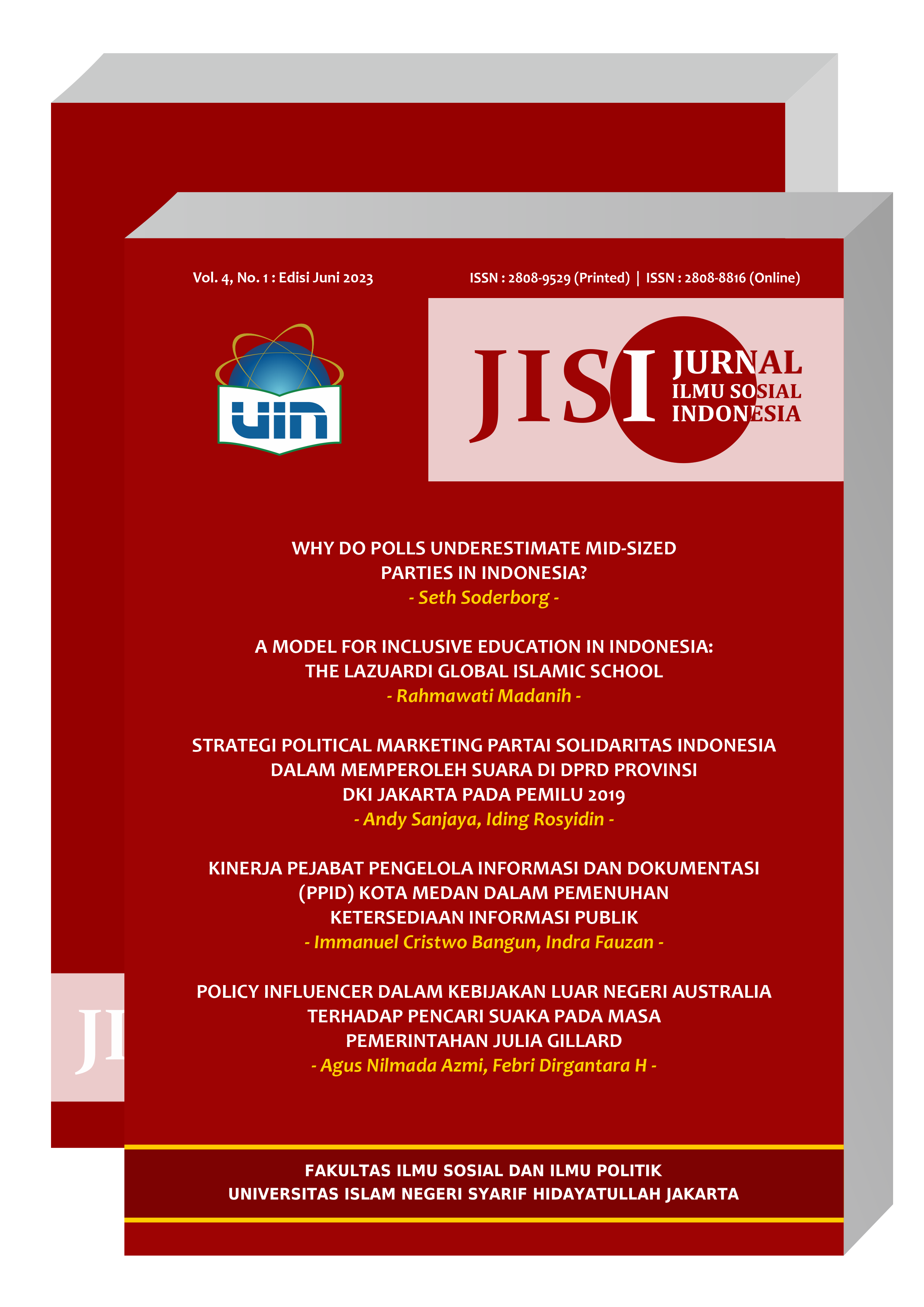Why do Polls Underestimate Mid-sized Parties in Indonesia?
DOI:
https://doi.org/10.15408/jisi.v4i1.33365Keywords:
Public opinion surveys, mid-sized parties, social desirability bias, pollster, sampling design, Indonesia, survei opini publik, partai menengah, bias keinginan sosial, lembaga survei, desain pengambilan sampel,Abstract
Abstract. Indonesian public opinion surveys consistently underestimate support for five mid-sized parties: PKB, PKS, NasDem, PAN, and PPP. This paper explores whether this consistent underestimation is the result of social desirability bias, late decisions or late mobilization, candidate-driven voter preferences, or sampling design. I find some evidence that parties with stronger mobilization networks and more candidate-centric strategies are more likely to be underestimated. A simulation study suggests that sampling design does not systematically disadvantage the parties in question. While social desirability bias is a possible cause of the downward bias, scholarly literature casts doubt on the social undesirability of expressed support for the parties. Further research should examine whether the types of voters who support the five underestimated parties might be harder to reach in surveys. Public opinion pollsters should consider noting in public statements that these mid-sized parties have tended to outperform their polls on election day.
Keywords: Public Opinion Surveys, Mid-Sized Parties, Social Desirability Bias, Pollster, Sampling Design, Indonesia.
Abstrak. Survei-survei opini publik Indonesia pra-pemilu secara konsisten menemukan dukungan kepada lima partai menengah: PKB, PKS, NasDem, PAN, dan PPP cenderung lebih rendah dibanding hasil aktual pemilu. Artikel ini menginvestigasi apakah prediksi yang lebih rendah dan konsisten ini merupakan akibat dari bias keinginan sosial (social desirability bias), pilihan elektoral atau mobilisasi yang telat, preferensi pemilih yang digerakkan oleh kandidat, atau desain pengambilan sampel. Naskah ilmiah ini menemukan bukti bahwa partai-partai dengan jaringan mobilisasi yang kuat dan strategi yang lebih berpusat pada kandidat cenderung kurang tercermin dinamika elektabilitasnya dalam survei. Studi ini menunjukkan bahwa desain sampling tidak secara sistematis berkontribusi atas kegagalan survei dalam memprediksi dukungan partai-partai menengah. Meskipun bias keinginan sosial adalah faktor yang memungkinkan penyebab angka elektabilitas yang terekam dalam survei cenderung rendah, literatur ilmiah sejauh ini meragukan bahwa bias tersebut merupakan faktor yang berpengaruh untuk kasus ini. Perlu studi lebih lanjut untuk mengkaji apakah sekelompok pemilih yang mendukung lima partai menengah yang mencatat bias dukungan lebih rendah di atas mungkin lebih sulit dijangkau dalam survei atau tidak. Lembaga-lembaga survei sebaiknya mempertimbangkan untuk menyampaikan kepada publik bahwa partai-partai menengah ini pada hari pemilihan cenderung mendapat dukungan lebih besar dibanding prediksi-prediksi survei pra-pemilu.
Kata Kunci: Survei Opini Publik, Partai Menengah, Bias Keinginan Sosial, Lembaga Survey, Desain Pengambilan Sampel, Indonesia.
References
Arzheimer, Kai, and Jocelyn Evans. 2014. “A New Multinomial Accuracy Measure for Polling Bias.” Political Analysis 22(01): 31–44.
Baker, Andy, and Lucio Renno. 2019. “Nonpartisans as False Negatives: The Mismeasurement of Party Identification in Public Opinion Surveys.” The Journal of Politics 81(3): 906–22.
Baswedan, Anies. 2004. “Political Islam in Indonesia: Present and Future Trajectory.” Asian Survey 44(5): 669–90.
Cerqueira, Carolina, Daniel Reis, Danilo Moliterno, and Marcello Sapio. 2022. “Pesquisas Erram e Divergem Dos Resultados Das Urnas.” CNN Brasil. https://www.cnnbrasil.com.br/politica/resultados-das-urnas-divergem-de-pesquisas-eleitorais/.
DeMaio, Theresa J. 1984. “Social Desirability and Survey Measurement: A Review.” In Surveying Subjective Phenomena, eds. Charles Turner and Elizabeth Martin., 257.
detikNews. 2012. “Partai Islam Disurvei Merosot, PPP: Itu Kesalahan Besar!” detiknews. https://news.detik.com/berita/d-2062225/partai-islam-disurvei-merosot-ppp-itu-kesalahan-besar (June 12, 2023).
Domínguez, Jorge I., and James A. McCann. 1998. Democratizing Mexico: Public Opinion and Electoral Choices. JHU Press.
Fernandes, Arya. 2018. “Politik Identitas Dalam Pemilu 2019: Proyeksi Dan Efektivitas.” CSIS.
Gelman, Andrew. 2016. “Brexit Polling: What Went Wrong? | Statistical Modeling, Causal Inference, and Social Science.” Statistical Modeling, Causal Inference, and Social Science. https://statmodeling.stat.columbia.edu/2016/06/24/brexit-polling-what-went-wrong/ (June 11, 2023).
Gomes, Israel. 2022. “Quais Pesquisas Erraram e Acertaram Resultado Do 2o Turno Entre Lula e Bolsonaro?” O Povo. https://www.opovo.com.br/eleicoes-2022/2022/10/31/quais-pesquisas-erraram-e-acertaram-resultado-do-2-turno-entre-lula-e-bolsonaro.html.
Indikator Politik. 2013. “Efek Popularitas Calon Legislatif Terhadap Elektabilitas Partai Jelang Pemilu 2014.” Presented at the Jakarta. http://www.indikator.co.id/uploads/20131014105703.20130730171101.INDIKATOR_Rilis_Survei_Efek_Calon_Terhadap_Partai.pdf.
Kennedy, Courtney et al. 2018. “An Evaluation of the 2016 Election Polls in the United States.” Public Opinion Quarterly 82(1): 1–33.
Mietzner, Marcus, Burhanuddin Muhtadi, and Rizka Halida. 2018. “Entrepreneurs of Grievance: Drivers and Effects of Indonesia’s Islamist Mobilization.” Bijdragen tot de taal-, land- en volkenkunde / Journal of the Humanities and Social Sciences of Southeast Asia 174(2–3): 159–87.
Prosser, Christopher, and Jonathan Mellon. 2018. “The Twilight of the Polls? A Review of Trends in Polling Accuracy and the Causes of Polling Misses.” Government and Opposition 53(4): 757–90.
Rebecca Staudenmaier. 2017. “German Election: Poll Puts Populist AfD in Third Place.” Deutsche Welle. https://www.dw.com/en/german-election-far-right-afd-third-in-latest-poll/a-40551590 (June 11, 2023).
Schnell, Rainer, and Marcel Noack. 2014. “The Accuracy of Pre-Election Polling of German General Elections.” Methods, Data, Analyses 8(1): 5–24.
Schreiber, Maria. 2022. “Pesquisas Eleitorais ‘erraram Tudo Em 2018’ Como Diz Bolsonaro?” Estado de Minas. https://www.em.com.br/app/noticia/politica/2022/09/26/interna_politica,1398068/pesquisas-eleitorais-erraram-tudo-em-2018-como-diz-bolsonaro.shtml.
Silver, Nate. 2018. “The Polls Are All Right.” FiveThirtyEight. https://fivethirtyeight.com/features/the-polls-are-all-right/ (June 11, 2023).
Soderborg, Seth. 2018. “Predicting Multiparty Elections with Limited Data: A Constituency-Level Model of Indonesian Elections.”. Working Paper.
Stout, Christopher T., and Reuben Kline. 2011. “I’m Not Voting for Her: Polling Discrepancies and Female Candidates.” Political Behavior 33(3): 479–503.
———. 2015. “Racial Salience, Viability, and the Wilder Effect: Evaluating Polling Accuracy for Black Candidates.” Public Opinion Quarterly 79(4): 994–1014.
Tanuwidjaja, Sunny. 2010. “Political Islam and Islamic Parties in Indonesia: Critically Assessing the Evidence of Islam´s Political Decline.” Contemporary Southeast Asia 32(1): 29–49.
———. 2012. “PKS in Post-Reformasi Indonesia: Catching the Catch-All and Moderation Wave.” South East Asia Research 20(4): 533–49.
UOL Eleições. 2018. “Pesquisas Eleitorais: Intenção de Voto No 1 Turno.” UOL Eleições 2018. https://noticias.uol.com.br/politica/eleicoes/2018/pesquisas-eleitorais/brasil/1-turno/.


